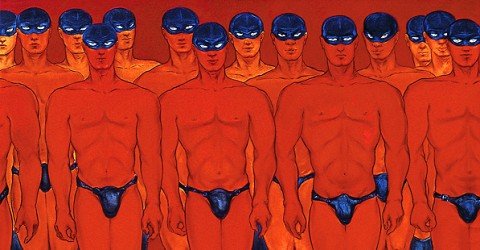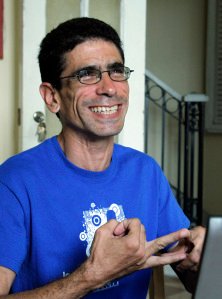Young Gays Can Now Complete Military Service in Cuba
August 8, 2017
A CubaNews translation.
Edited by Walter Lippmann.
Cuban deputies received an explanation of a policy of the Revolutionary Armed Forces (FAR) that has been in force for a year or two to accept and place young homosexuals in military service, respecting their right to participate in the defense of the country.
The issue arose during the work session of the National Defence Commission, which on last July 10 evaluated the results of the inscriptions in the Military Register and the incorporation of young people into active military service (SMA).
As part of the debates prior to the last ordinary session of the National Assembly of People’s Power, representatives of military institutions and members of other permanent commissions such as Health and Sport; Education, Culture, Science, Technology and the Environment; and Care for Youth, Children and Equal Rights of Women also participated in this meeting.
Although this aspect of the discussion on compliance with the SMA did not transcend any of the journalistic versions I could consult on the meeting, its approach in our Parliament is undoubtedly of great news, relevance and political and public interest for the Cuban LGBTI community.
That is why I sought information from fellow journalists there, but it was not until only a few days ago that I had access to the audio recordings of the question posed by Joaquín Lázaro Cruz Martín, a member of parliament for the municipality of Boyeros in the capital and a member of the Committee on Youth, Children and Equal Rights for Women; and the response given by Brigadier General Juan Rafael Ruiz Pérez, also a member of parliament and chairman of the Committee on National Defence.
Perhaps another time is left for the analysis of the importance of this event. I believe that both interventions deserve to be analysed. I confess as an advance that right now it is difficult for me to assess what is more important, if the fact that a deputy asked about the participation of homosexuals in the army and defended it in public; or the response of the president of the National Defence Committee, when reporting on a policy that still has obvious discriminatory features – he himself admits that it is not perfect – but that in practice it represents without doubt a qualitative leap towards the recognition of the rights of LGBTI people in Cuba.
However, many concerns and doubts remain unresolved, not only regarding the inclusion of gay soldiers in the FAR, but also regarding the rights of gay, lesbian, bisexual and transgender people who aspire to or even become officers.
Without further ado, I transcribe the question and the answer in its entirety, with only small adjustments that I had to make to try to be faithful in the written language to the tone and intention of the speaker, to separate the ideas into sentences as brief as possible, as well as to avoid direct or colloquial references and mentions to some people present whose names I found unintelligible in the recording.
Deputy Joaquín Lázaro Cruz Martín: The other issue I have, which concerns me greatly, is exactly what would be the policy to follow, in this material specifically, with young homosexuals and bisexuals.
How it is treated, how politics is with these young people, who are not different at all in our society; that is, they deserve a place of respect too, that is their sexual preference and I do not think that this will influence at all….
Right now it’s time to add, not subtract, and we need everyone’s support. It is no secret to anyone that at the moment, as we can see that they are not being discriminated against as much as in previous times – although discrimination still exists, it is a problem that concerns us all – many more are increasingly identified…
Thank you very much.
Congressman Juan Rafael Ruiz Pérez, President of the National Defence Committee: I am going to take the floor on this last issue to explain and make it clear.
As you have heard, there is in the Armed Forces – we have known this before – a commission of the body that establishes policy for the performance of military service.
In other words, military service is in a law, the law has its regulations, but this commission is establishing policies. For example, no law says anything about the year deferred, about the boy who took a college degree. That’s a policy.
Service is two years, everyone must complete it, et cetera, et cetera, et cetera… Ah, but if you pass the entrance exams and get a degree, then the policy is that you must only serve one year, to interfere as little as possible in your incorporation. That’s politics.
Then, with regard to this issue raised by the companero, a policy was established and approved a year ago, perhaps two years ago, which is essentially the following:
First, no young person, because of his social preference (sic) is excluded from being able to fulfill his preparation for the defense of his country.
Second, if that young man is called, but he considers that for this reason, he will not be able to perform his service in the conditions of a military place, he is excluded.
And thirdly, we also try to apply a third alternative that exists, and that can allow you to comply with the first, without having to fall into the traditional, let’s say, two-year service in a military unit, in maneuvers, etc…. It can also be conducted so that the performance of your military service, and therefore of the law, does so through alternative forms.
Therefore, a young person with these characteristics is called military service, gives basic military training, if possible, and is assigned to alternative military service. Say, he can be a nurse, an auxiliary in a hospital, he can even be in a military hospital, or he can be assigned to work elsewhere.
He’s doing his service, he’s complying with the law, he’s carrying out his duty to the homeland. He may have prepared for defense, and yet he is in conditions that may be more appropriate for the situation.
Ah, no, you’re capable that even if you have your… overcome that, and keep yourself… Because also the environment can influence a lot. We’re talking about a barracks with 80 of another preference, talking about other things, saying other things… Oh, not you?… Right, you’re not called and you’re given that chance.
What happens, that sometimes this happens when they say about a case that came in and that after it was detected. Well, this is sometimes not detected, because sometimes even the person doesn’t want to say it yet….
Is it detected later? We do that. You can’t, Counselor. Yeah, you’re licensed. Any chance you’re going to finish it by alternative means in one place, according to a plan, et cetera? That’s a variant. Another variant? No, you’re going home.
That is to say, what must be clear: that is why nobody is exempted – by politics – from their right to prepare themselves to defend their homeland.
But, taking into account the existing conditions and so on…. As you say yourself, military service is not a panacea, that’s what it is, that’s what it takes, that’s what it takes, that’s what it takes, that’s what it takes and so on. No (can’t)…, well, it’s not going, now. It’s not going. It’s not a disease, it just doesn’t go, because of the conditions, it’s a possibility you give it. Or also, to go towards that other channel that can be service through alternative forms.
That is the policy that is approved, in writing, oriented towards the whole country, what happens is that these things happen, because sometimes they are not detected and can be chosen, well, then you do what you did, you know what I mean?
But the policy is approved, and this is what is being followed. Doesn’t mean it’s perfect, everything here is provisional. But the issue has already been identified, and that is what is being done.
Who is Paquito?
I am Paquito, from CUBA; I am a Marti follower and a an author; I am a communist and gay journalist; I am a convinced and superstitious atheist; I am the father of a son whom I have adored and have been a partner for fifteen years with a seronegative man who loves me; I have been an AIDS patient since 2003 andam a survivor of non-Hodgkin’s lymphoma for more than twelve years; I am a university professor and a student of life; a follower of Cuban economic issues and a passionate devourer of universal literature; an incontinent and belligerent moderate; a friend of my friends and a compassionate friend of my enemies; often wrong and never repentant; a hardened and eternal enthusiastic optimist; alive and kicking; in short, another ordinary man who wants to share his story, opinions and desires with you…



You must be logged in to post a comment.